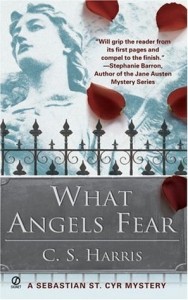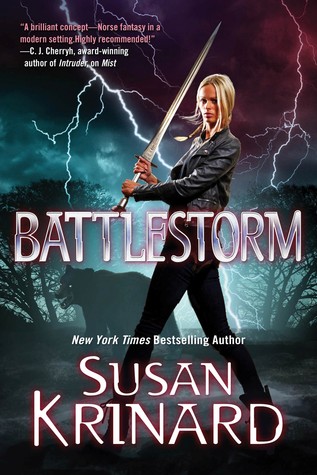 Battlestorm (Midgard, #3) by Susan Krinard
Battlestorm (Midgard, #3) by Susan Krinard Formats available: paperback, ebook
Series: Midgard #3
Pages: 480
Published by Tor Books on March 29th 2016
Purchasing Info: Author's Website, Publisher's Website, Amazon, Barnes & Noble, Kobo, Bookshop.org
Goodreads
The third installment in New York Times bestselling author Susan Krinard’s first urban fantasy series...
Centuries ago, the Norse gods and goddesses fought their Last Battle with the trickster god Loki and his frost giants. All were believed lost, except for a few survivors…including the Valkyrie Mist, forgotten daughter of the goddess Freya.
But the battle isn’t over, and Mist—living a mortal life in San Francisco—is at the center of a new war, with the fate of earth hanging in the balance. As old enemies and allies reappear around the city, Mist must determine who to trust, all while learning to control her own growing power.
It will take all of Mist’s courage, determination, and newfound magical abilities to stop Loki before history repeats itself.
My Review:
This is one of those stories where it isn’t so much that “the enemy of my enemy is my friend” or even “the enemy of my enemy is my ally” but rather “the enemy of my enemy is someone else I can betray sooner or later, probably sooner.”
It feels like Battlestorm is the bastard child of American Gods and Babylon 5, and I’m still not sure whether I mean that in a good way or not.
Just as in American Gods, the primary movers and shakers of the story are gods from the Norse pantheon, Odin, Loki, and for added spice and betrayal, Freya. This is also as complex and dense a story as American Gods, without having any of its lighter moments. Battlestorm is Ragnarök moved to Midgard, meaning our present-day Earth, with all the possibilities for the end of the world as we know it that the idea of Ragnarök implies.
American Gods was much lighter in comparison, and that’s saying something.
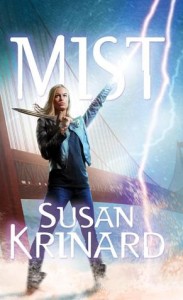 Like the long story arc of Babylon 5, the story began in Mist and continued in Black Ice has the feel of a long-anticipated and often repeated battle between Good and Evil. However, just as in Babylon 5, now that the forces of Good have revealed themselves in Odin, the contest is nowhere near that clear cut. Instead, we have a battle between the forces of Order and Chaos. Loki represents the forces of Chaos, and he desires a world where all law and order is eliminated, and only the strongest and most ruthless survive. On that infamous other hand, Odin represents Order. But Order with a capital O is not necessarily good. Odin is a force for the tyranny of order, a world where he will be the absolute ruler and utter dictator, and humanity can only exist in a state of blind obedience.
Like the long story arc of Babylon 5, the story began in Mist and continued in Black Ice has the feel of a long-anticipated and often repeated battle between Good and Evil. However, just as in Babylon 5, now that the forces of Good have revealed themselves in Odin, the contest is nowhere near that clear cut. Instead, we have a battle between the forces of Order and Chaos. Loki represents the forces of Chaos, and he desires a world where all law and order is eliminated, and only the strongest and most ruthless survive. On that infamous other hand, Odin represents Order. But Order with a capital O is not necessarily good. Odin is a force for the tyranny of order, a world where he will be the absolute ruler and utter dictator, and humanity can only exist in a state of blind obedience.
Poor Mist is caught in the middle. She wants to protect the people of Midgard, among whom she has lived for centuries. She believes that humanity should be left to determine its own path, without interference from her gods. But as a Valkyrie, Odin commands her obedience. And Loki holds those she loves captive.
Mist is going to have to betray someone in order to protect those she holds dear. Including the entire human race.
Escape Rating C+: If the concept of the Norse gods coming to contemporary earth to enact their final battle, or anything else, appeals to you, start this series at the beginning, with Mist. The three book series, Mist, Black Ice and now Battlestorm, is one long saga (how fitting!) and must be read in order to make any sense at all.
That being said, I personally think the whole thing probably works better if you can manage to read the whole thing not just in order but also close together. There are so many players in this story, so many wheels within wheels, that it feels impossible to remember who is betraying whom, and why, a year after the previous book. For those readers who, like me, read the books as they came out, I sincerely hope that the finished copy includes a synopsis of previous events. The ARC I read did not, and I really needed one.
A primer on the Norse pantheon probably wouldn’t hurt either, particularly focused on who is related to whom. Loki had a surprising number of powerful and interesting children, who all have agendas of their own, and do not always obey their father. But then, Odin has that problem with his kids as well. In Battlestorm, Loki’s personality and his relationship with his father feel like they owe a lot to Tom Hiddleston’s portrayal in the Marvel Cinematic Universe.
I found Battlestorm to be dense. It took me twice as long to read it as I expected, because I kept needing to step away and digest what had just happened – meaning what had just gone wrong. Mist never catches a break. She also seems to always be the last person in the universe to find out or be told information that is crucial to her fight and even to her very existence. There are a few too many instances where someone is just about to tell her something she desperately needs to know – only to be interrupted and the opportunity disappear for days and pages. For the daughter of a goddess, Mist seems woefully, or deliberately, misinformed about damn near everything all of the time.
This is the part that reminded me most of American Gods. Not just the Norse pantheon, but Mist’s position is a lot like Shadow’s. She has been created for a purpose that she has no clues about, but is led around by the nose by beings who are much better informed than she is and who are deliberately keeping her in the dark. And in the end, very little is as it originally seemed, to her or to the reader. Also like Shadow.
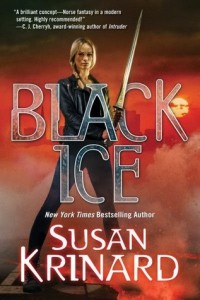 For anyone who has read my reviews of Mist and Black Ice, I was dead wrong about Orn’s identity. The true identity of the parrot becomes totally clear very early in Battlestorm. Just call him Mr. Wednesday.
For anyone who has read my reviews of Mist and Black Ice, I was dead wrong about Orn’s identity. The true identity of the parrot becomes totally clear very early in Battlestorm. Just call him Mr. Wednesday.
If some of the description of and comments about Battlestorm appeal, try American Gods. It is positively awesome, where Battlestorm has both its moments and its moments of frustration. If the idea of evil being good and good being evil sounds interesting, try Banewreacker and Godslayer by Jacqueline Carey, which explore the same themes.
In the end, I was glad I finished Battlestorm and saw the story begun in Mist and Black Ice come to at least some resolution.

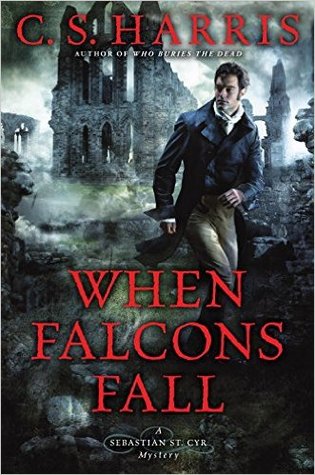 When Falcons Fall (Sebastian St. Cyr, #11) by
When Falcons Fall (Sebastian St. Cyr, #11) by 